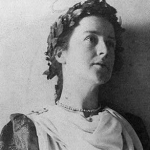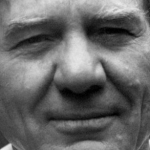I
We thrill too strangely at the master's touch;
We shrink too sadly from the larger self
Which for its own completeness agitates
And undetermines us; we do not feel—
We dare not feel it yet—the splendid shame
Of uncreated failure; we forget,
The while we groan, that God's accomplishment
Is always and unfailingly at hand.
II
Tumultuously void of a clean scheme
Whereon to build, whereof to formulate,
The legion life that riots in mankind
Goes ever plunging upward, up and down,
Most like some crazy regiment at arms,
Undisciplined of aught but Ignorance,
And ever led resourcelessly along
To brainless carnage by drunk trumpeters.
III
To me the groaning of world-worshippers
By one with art enough to cleave the walls
Of heaven with his cadence, but without
The wisdom or the will to comprehend
The strangeness of his own perversity,
And all without the courage to deny
The profit and the pride of his defeat.
IV
While we are drilled in error, we are lost
Alike to truth and usefulness. We think
We are great warriors now, and we can brag
Like Titans; but the world is growing young,
And we, the fools of time, are growing with it:—
We do not fight to-day, we only die;
We are too proud of death, and too ashamed
Of god, to know enough to be alive.
V
There is one battle-field whereon we fall
Triumphant and unconquered; but, alas!
We are too fleshly fearful of ourselves
To fight there till our days are whirled and blurred
By sorrow, and the ministering wheels
Of anguish take us eastward, where the clouds
Of human gloom are lost against the gleam
That shines on Thought's impenetrable mail.
VI
When we shall hear no more the cradle-songs
Of ages—when the timeless hymns of love
Defeat them and outsound them—we shall know
The rapture of that large release which all
Right science comprehends; and we shall read,
With unoppressed and unoffended eyes,
That record of All-Soul whereon God writes
In everlasting runes the truth of Him.
VII
The guerdon of new childhood is repose:—
Once he has read the primer of right thought,
A man may claim between two smithy strokes
Beatitude enough to realize
God's parallel completeness in the vague
And incommensurable excellence
That equitably uncreates itself
And makes a whirlwind of the Universe.
VIII
There is no loneliness:—no matter where
We go, nor whence we come, nor what good friends
Forsake us in the seeming, we are all
At one with a complete companionship;
And though forlornly joyless be the ways
We travel, the compensate spirit-gleams
Of Wisdom shaft the darkness here and there,
Like scattered lamps in unfrequented streets.
IX
When one that you and I had all but sworn
To be the purest thing God ever made
Bewilders us until at last it seems
An angel has come back restigmatized,—
Faith wavers, and we wonder what there is
On earth to make us faithful any more,
But never are quite wise enough to know
The wisdom that is in that wonderment.
X
Where does a dead man go?—The dead man dies;
But the free life that would no longer feed
On fagots of outburned and shattered flesh
Wakes to a thrilled invisible advance,
Unchained (or fettered else) of memory;
And when the dead man goes it seems to me
'T were better for us all to do away
With weeping, and be glad that he is gone.
XI
So through the dusk of dead, blank-legended,
And unremunerative years we search
To get where life begins, and still we groan
Because we do not find the living spark
Where no spark ever was; and thus we die,
Still searching, like poor old astronomers
Who totter off to bed and go to sleep,
To dream of untriangulated stars.
XII
With conscious eyes not yet sincere enough
To pierce the glimmered cloud that fluctuates
Between me and the glorifying light
That screens itself with knowledge, I discern
The searching rays of wisdom that reach through
The mist of shame's infirm credulity,
And infinitely wonder if hard words
Like mine have any message for the dead.
XIII
I grant you friendship is a royal thing,
But none shall ever know that royalty
For what it is till he has realized
His best friend in himself. 'T is then, perforce,
That man's unfettered faith indemnifies
Of its own conscious freedom the old shame,
And love's revealed infinitude supplants
Of its own wealth and wisdom the old scorn.
XIV
Though the sick beast infect us, we are fraught
Forever with indissoluble Truth,
Wherein redress reveals itself divine,
Transitional, transcendent. Grief and loss,
Disease and desolation, are the dreams
Of wasted excellence; and every dream
Has in it something of an ageless fact
That flouts deformity and laughs at years.
XV
We lack the courage to be where we are:—
We love too much to travel on old roads,
To triumph on old fields; we love too much
To consecrate the magic of dead things,
And yieldingly to linger by long walls
Of ruin, where the ruinous moonlight
That sheds a lying glory on old stones
Befriends us with a wizard's enmity.
XVI
Something as one with eyes that look below
The battle-smoke to glimpse the foeman's charge,
We through the dust of downward years may scan
The onslaught that awaits this idiot world
Where blood pays blood for nothing, and where life
Pays life to madness, till at last the ports
Of gilded helplessness be battered through
By the still crash of salvatory steel.
XVII
To you that sit with Sorrow like chained slaves,
And wonder if the night will ever come,
I would say this: The night will never come,
And sorrow is not always. But my words
Are not enough; your eyes are not enough;
The soul itself must insulate the Real,
Or ever you do cherish in this life—
In this life or in any life—repose.
XVIII
Like a white wall whereon forever breaks
Unsatisfied the tumult of green seas,
Man's unconjectured godliness rebukes
With its imperial silence the lost waves
Of insufficient grief. This mortal surge
That beats against us now is nothing else
Than plangent ignorance. Truth neither shakes
Nor wavers; but the world shakes, and we shriek.
XIX
Nor jewelled phrase nor mere mellifluous rhyme
Reverberates aright, or ever shall,
One cadence of that infinite plain-song
Which is itself all music. Stronger notes
Than any that have ever touched the world
Must ring to tell it—ring like hammer-blows,
Right-echoed of a chime primordial,
On anvils, in the gleaming of God's forge.
XX
The prophet of dead words defeats himself:
Whoever would acknowledge and include
The foregleam and the glory of the real,
Must work with something else than pen and ink
And painful preparation: he must work
With unseen implements that have no names,
And he must win withal, to do that work,
Good fortitude, clean wisdom, and strong skill.
XXI
To curse the chilled insistence of the dawn
Because the free gleam lingers; to defraud
The constant opportunity that lives
Unchallenged in all sorrow; to forget
For this large prodigality of gold
That larger generosity of thought,—
These are the fleshly clogs of human greed,
The fundamental blunders of mankind.
XXII
Forebodings are the fiends of Recreance;
The master of the moment, the clean seer
Of ages, too securely scans what is,
Ever to be appalled at what is not;
He sees beyond the groaning borough lines
Of Hell, God's highways gleaming, and he knows
That Love's complete communion is the end
Of anguish to the liberated man.
XXIII
Here by the windy docks I stand alone,
But yet companioned. There the vessel goes,
And there my friend goes with it; but the wake
That melts and ebbs between that friend and me
Love's earnest is of Life's all-purposeful
And all-triumphant sailing, when the ships
Of Wisdom loose their fretful chains and swing
Forever from the crumbled wharves of Time.





Comment form: